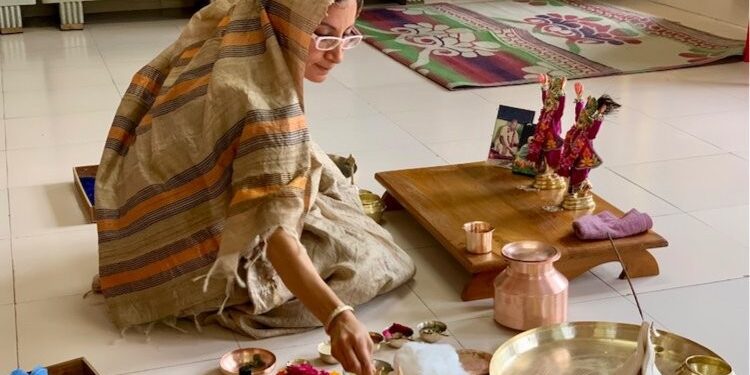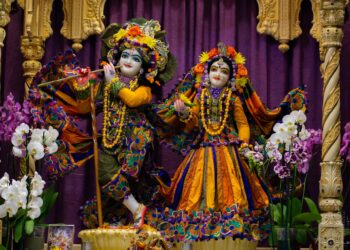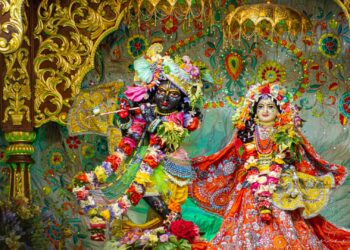The following are offenses in Deity Worship:
- (a) to enter the temple with shoes or being carried on a palanquin,
- (b) not to observe the prescribed festivals,
- (c) to avoid offering obeisances in front of the Deity,
- (d) to offer prayers in an unclean state, not having washed one’s hands after eating,
- (e) to offer obeisances with one hand,
- (f) to circumambulate directly in front of the Deity,
- (g) to spread one’s legs before the Deity,
- (h) to sit before the Deity while holding one’s ankles with one’s hands,
- (i) to lie down before the Deity,
- (j) to eat before the Deity,
- (k) to speak lies before the Deity,
- (l) to address someone loudly before the Deity,
- (m) to talk nonsense before the Deity,
- (n) to cry before the Deity,
- (o) to argue before the Deity,
- (p) to chastise someone before the Deity,
- (q) to show someone favor before the Deity,
- (r) to use harsh words before the Deity,
- (s) to wear a woollen blanket before the Deity,
- (t) to blaspheme someone before the Deity,
- (u) to worship someone else before the Deity,
- (v) to use vulgar language before the Deity,
- (w) to pass air before the Deity,
- (x) to avoid very opulent worship of the Deity, even though one is able to perform it,
- (y) to eat something not offered to the Deity,
- (z) to avoid offering fresh fruits to the Deity according to the season,
- (aa) to offer food to the Deity which has already been used or from which has first been given to others (in other words, food should not be distributed to anyone else until it has been offered to the Deity),
- (bb) to sit with one’s back toward the Deity,
- (cc) to offer obeisances to someone else in front of the Deity,
- (dd) not to chant proper prayers when offering obeisances to the spiritual master,
- (ee) to praise oneself before the Deity, and
- (ff) to blaspheme the demigods. In the worship of the Deity, these thirty-two offenses should be avoided.
In the Varāha Purāṇa the following offenses are mentioned:
- (a) to eat in the house of a rich man,
- (b) to enter the Deity’s room in the dark,
- (c) to worship the Deity without following the regulative principles,
- (d) to enter the temple without vibrating any sound,
- (e) to collect food that has been seen by a dog,
- (f) to break silence while offering worship to the Deity,
- (g) to go to the toilet during the time of worshiping the Deity,
- (h) to offer incense without offering flowers,
- (i) to worship the Deity with forbidden flowers,
- (j) to begin worship without having washed one’s teeth,
- (k) to begin worship after sex,
- (l) to touch a lamp, dead body or a woman during her menstrual period, or to put on red or bluish clothing, unwashed clothing, the clothing of others or soiled clothing.
Other offenses are to worship the Deity after seeing a dead body, to pass air before the Deity, to show anger before the Deity, and to worship the Deity just after returning from a crematorium. After eating, one should not worship the Deity until one has digested his food, nor should one touch the Deity or engage in any Deity worship after eating safflower oil or hing. These are also offenses.
In other places, the following offenses are listed:
- (a) to be against the scriptural injunctions of the Vedic literature or to disrespect within one’s heart the Śrīmad-Bhāgavatam while externally falsely accepting its principles,
- (b) to introduce differing śāstras,
- (c) to chew pan and betel before the Deity,
- (d) to keep flowers for worship on the leaf of a castor oil plant,
- (e) to worship the Deity in the afternoon,
- (f) to sit on the altar or to sit on the floor to worship the Deity (without a seat),
- (g) to touch the Deity with the left hand while bathing the Deity,
- (h) to worship the Deity with a stale or used flower,
- (i) to spit while worshiping the Deity,
- (j) to advertise one’s glory while worshiping the Deity,
- (k) to apply tilaka to one’s forehead in a curved way,
- (l) to enter the temple without having washed one’s feet,
- (m) to offer the Deity food cooked by an uninitiated person,
- (n) to worship the Deity and offer bhoga to the Deity within the vision of an uninitiated person or non-Vaiṣṇava,
- (o) to offer worship to the Deity without worshiping Vaikuṇṭha deities like Gaṇeśa,
- (p) to worship the Deity while perspiring,
- (q) to refuse flowers offered to the Deity,
- (r) to take a vow or oath in the holy name of the Lord.
If one commits any of the above offenses, one must read at least one chapter of Bhagavad-gītā. This is confirmed in the Skanda-Purāṇa, Avantī-khaṇḍa. Similarly, there is another injunction, stating that one who reads the thousand names of Viṣṇu can be released from all offenses. In the same Skanda-Purāṇa, Revā-khaṇḍa, it is said that one who recites prayers to tulasī or sows a tulasī seed is also freed from all offenses. Similarly, one who worships the śālagrāma-śilā can also be relieved of offenses. In the Brahmaṇḍa Purāṇa it is said that one who worships Lord Viṣṇu, whose four hands bear a conchshell, disc, lotus flower and club, can be relieved from the above offenses. In the Ādi-varāha Purāṇa it is said that a worshiper who has committed offenses may fast for one day at the holy place known as Śaukarava and then bathe in the Ganges.



















